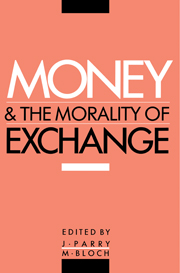Book contents
- Frontmatter
- Contents
- List of contributors
- 1 Introduction: Money and the morality of exchange
- 2 Misconceiving the grain heap: a critique of the concept of the Indian jajmani system
- 3 On the moral perils of exchange
- 4 Money, men and women
- 5 Cooking money: gender and the symbolic transformation of means of exchange in a Malay fishing community
- 6 Drinking cash: the purification of money through ceremonial exchange in Fiji
- 7 The symbolism of money in Imerina
- 8 Resistance to the present by the past: mediums and money in Zimbabwe
- 9 Precious metals in the Andean moral economy
- 10 The earth and the state: the sources and meanings of money in Northern Potosí, Bolivia
- Index
1 - Introduction: Money and the morality of exchange
Published online by Cambridge University Press: 20 February 2010
- Frontmatter
- Contents
- List of contributors
- 1 Introduction: Money and the morality of exchange
- 2 Misconceiving the grain heap: a critique of the concept of the Indian jajmani system
- 3 On the moral perils of exchange
- 4 Money, men and women
- 5 Cooking money: gender and the symbolic transformation of means of exchange in a Malay fishing community
- 6 Drinking cash: the purification of money through ceremonial exchange in Fiji
- 7 The symbolism of money in Imerina
- 8 Resistance to the present by the past: mediums and money in Zimbabwe
- 9 Precious metals in the Andean moral economy
- 10 The earth and the state: the sources and meanings of money in Northern Potosí, Bolivia
- Index
Summary
This collection is concerned with the way in which money is symbolically represented in a range of different societies and, more especially, with the moral evaluation of monetary and commercial exchanges as against exchanges of other kinds. The focus, then, is on the range of cultural meanings which surround monetary transactions, and not on the kinds of problems of monetary theory which have conventionally preoccupied the economist. There is now a very large literature on so-called ‘primitive money’, but this does not centrally concern us here since all the chapters in this volume deal principally either with state-issued currencies which act as a general medium of exchange, or – as in our two Andeanist contributions – with the symbolism of precious metals and their relevance to Andean ideologies of production and exchange.
The first thing these essays collectively emphasise is the enormous cultural variation in the way in which money is symbolised and in which this symbolism relates to culturally constructed notions of production, consumption, circulation and exchange. It becomes clear that in order to understand the way in which money is viewed it is vitally important to understand the cultural matrix into which it is incorporated. This may seem a bland enough lesson, but it is one which has often been forgotten by anthropologists writing about money – and less culpably also by historians and sociologists. As a result they have commonly fallen into the trap of attributing to money in general what is in fact a specific set of meanings which derive from our own culture.
- Type
- Chapter
- Information
- Money and the Morality of Exchange , pp. 1 - 32Publisher: Cambridge University PressPrint publication year: 1989
- 134
- Cited by



